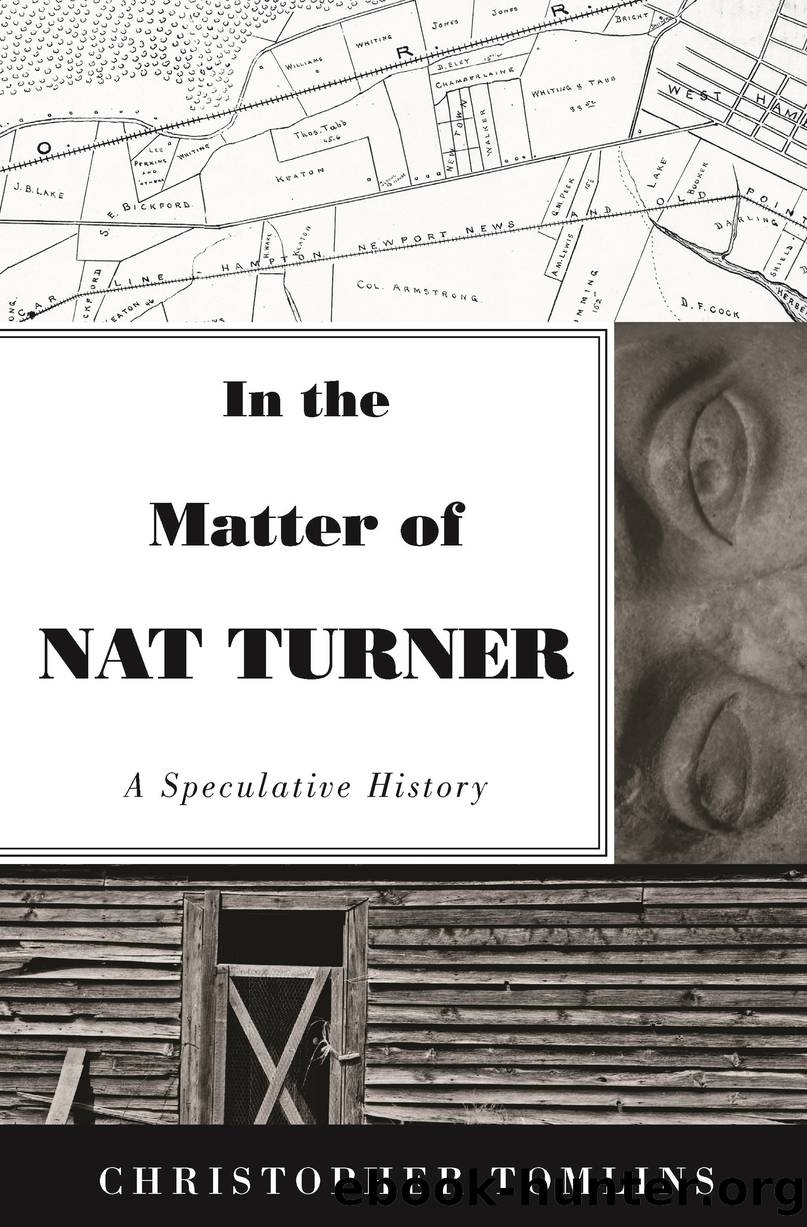In the Matter of Nat Turner by Tomlins Christopher;

Author:Tomlins, Christopher;
Language: eng
Format: epub
Publisher: Princeton University Press
Published: 2019-12-05T00:00:00+00:00
* * *
To use so apparently abstruse an engagement in the philosophy of history as an interpretive prism on empirical events is not without risk.50 Still, in Turnerâs confessionâits first part at leastâand in the Southampton County Courtâs response to Turner we are dealing with philosophies of history quite as much as with historical events. Hence, resort to one species of messianic philosophy of history to help unravel another may be worthwhile.
With this in mind, consider first the philosophy manifest in Turnerâs utterly fractile statement that he did not feel guilty. Saidiya Hartman has drawn to our attention lawâs ruthless annexation of the African American, whether slave or freed, to guilt/debt. The self haltingly realized by the African American is entirely supplanted by a self imposed by lawâa self of criminality and obligation.51 Here (in Hamacherâs terms) Turner is refusing that burden, stating that he is the not of the âload of guiltâ that the court insists he bear for the dispatch of âvaluable citizensâ from âTime to Eternity.â In the first part of the Confessions he has explicitly located the self of faith he has fashioned for himself far beyond the universalized guilt/debt nexus in which the court (with its cultic insistence that its acts be worshipped and credited) is so plainly embedded. To the courtâs demand that he humbly accept its retribution he has ânothing more to say.â52
How can he stand beyond that nexus, which, we have seen, Benjamin appears to hold inescapableâa perfect fusion of the economic and the juridical with the moral and the psychological?53 Consider the terms of Turnerâs decision to act: âI heard a loud noise in the heavens and the Spirit instantly appeared to me and said the Serpent was loosened and Christ had laid down the yoke he had born for the sins of men, and that I should take it on and fight against the Serpent.â54 In Christian eschatology the final battle against Satan immediately precedes the Last Judgment, when all forms of existence known hitherto are annihilated,55 when âwhosoever ⦠not found written in the book of life [is] cast into the lake of fire,â leaving only pure origin and end, âAlpha and Omegaâ: Godâs eternal, forgiving, reign over man.56 In Benjaminian terms, Godâs final abandonment of His burden of guilt (laying down the yoke) signifies Hamacherâs âjump backâ to originâa distinct representation of the ânotâ of guiltâand the end of the time of retribution in the tempest of Messianic forgiveness and judgment. The parallel between the two representations of extremity is remarkable:
If [liberation] is neither possible within the guilt-relations of the capital religion nor without them, then it is possible in a placeâand only hereâwhere these relations have reached an extreme that belongs neither to these relations themselves nor to their outside. The possibility of liberation from guilt can thus only be located at the very extreme of guilt. This extreme would be the outer- and innermost limit upon which guilt is no longer itself and yet is nothing other than itself, where it isâas guiltâfreed of itself.
Download
This site does not store any files on its server. We only index and link to content provided by other sites. Please contact the content providers to delete copyright contents if any and email us, we'll remove relevant links or contents immediately.
Machine Learning at Scale with H2O by Gregory Keys | David Whiting(3645)
Harry Potter and the Goblet Of Fire by J.K. Rowling(3612)
Never by Ken Follett(3535)
Unfinished: A Memoir by Priyanka Chopra Jonas(3213)
Fairy Tale by Stephen King(2953)
The Man Who Died Twice by Richard Osman(2811)
Will by Will Smith(2581)
Rationality by Steven Pinker(2151)
The Dark Hours by Michael Connelly(2081)
The Storyteller by Dave Grohl(2068)
It Starts With Us (It Ends with Us #2) by Colleen Hoover(2046)
The Dawn of Everything: A New History of Humanity by David Graeber & David Wengrow(2018)
Friends, Lovers, and the Big Terrible Thing by Matthew Perry(2005)
Can't Hurt Me: Master Your Mind and Defy the Odds - Clean Edition by David Goggins(2004)
The Stranger in the Lifeboat by Mitch Albom(1937)
The Becoming by Nora Roberts(1920)
Cloud Cuckoo Land by Anthony Doerr(1914)
Love on the Brain by Ali Hazelwood(1820)
New Morning Mercies: A Daily Gospel Devotional by Paul David Tripp(1814)
